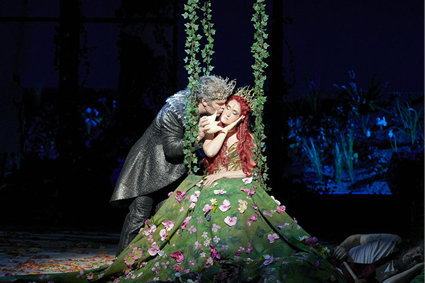| Opera Reviews | 6 May 2024 |
An opulent and entertaining evening spiked with humour and intensityby Moore Parker |
|
| Britten: A Midsummer Night's Dream
Vienna State Opera 17 October 2019 |
|

Lawrence Zazzo (Oberon), Erin Morley (Tytania)
|
|
|
The Vienna State Opera first presented Britten’s A Midsummer Night’s Dream in 1962 - two years after its Aldeburgh world premier, and as Dominique Meyer enters his final year as Company Director, the work returns as the first new State Opera production of the current season. Irina Brook (whose 2015 Don Pasquale in the house enjoys enduring popularity) has a close association with the Shakespeare original which inspired the opera (in part through her father’s famous 1970 RSC version) and now - with two successful stagings of the play under her belt - is undertaking the operatic version for the first time. Updated, and set (Noëlle Ginefri-Corbel) in a decaying stately home which Mother Nature has begun reclaiming, the essential structure remains throughout the evening, with fairy tale nuances hinted through foliage and blossoms accented on accessories and costumes (Magali Castellan). The large cast is well-balanced and includes a generous line-up of youngsters from the State Opera school - but with the overall scale remaining modest and a touch under par for the demands of the large auditorium. Enunciation - or the lack thereof - plagued most of the cast on occasions (and in some cases throughout the evening), severely thwarting the piece’s impact - despite evident efforts and a finely-defined cast of characters. The production begins atmospherically with subdued lighting (Jean Kalman) and an enormous, luminous-eyed serpent manoeuvered across the stage by a pair of keepers. This transpires to be Oberon’s accompanying mascot - albeit one which risks a certain tedium with repetition. Tytania’s references to untypical changes in the seasons are obliquely underscored by children’s banners “Save our forest”, “Nature first”, etc., which add a current “Extinction Rebellion” touch - while as the plot advances, the basic set is augmented by a couple of ample armchairs (alias thrones for Theseus and Hippolyta) and a roll-on make-shift stage to accommodate Act 3’s wedding celebrations and the Mechanicals’ farce, with its touch of Brighton Pier slapstick. Lawrence Zazzo, giving his house debut in this production, brings a dignified and vocally even-scaled Oberon, well-complimented by Erin Morley’s poised Tytania - but with both, however, a touch subdued and lacklustre in their grandeur. The quartet of convincing young lovers is drawn from the State Opera’s ensemble, with Valentina Naforniță (Helena), Rachel Frenkel (Hermia), Rafael Fingerlos (Demetrius), and interesting tenor-newcomer Josh Lovell (Lysander) evidently relishing their romp as four school-uniformed teens. A wonderfully-contrasting sextet of Mechanicals (here clad as workmen) made a delightful pack of comedians - with antics led by Peter Rose as a tirelessly energetic Bottom, superbly complimented by Wolfgang Bankl’s Peter Quince, Thomas Ebenstein’s Snout, Clemens Unterreiner’s Starveling, William Thomas’ Snug - and last but not least, Benjamin Hulett as Flute and a shrillingly flamboyant Thisbe. Peter Kellner (Theseus) and Szilvia Vörös (Hippolyta) made up for rather unimaginative staging in their scene with impressive vocal showings. However it was left to the mercurial flair of Théo Touvet with his extraordinary acrobatic talent to truly ignite the show as Puck - and indeed steal the limelight at the final curtain. In the pit, Simone Young skillfully negotiated her forces with unfaltering regard for the cast and the demands of the staging, while drawing a consummate kaleidoscope of colour and effect from Britten’s score. In all, an opulent and entertaining evening spiked with humour and intensity - if one somewhat lightweight in charm and sense of mystery or magic.
|
|
| Text ©
Moore Parker Photo © Wiener Staatsoper / Michael Pöhn |
|







